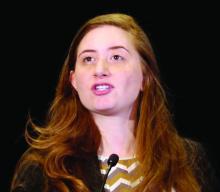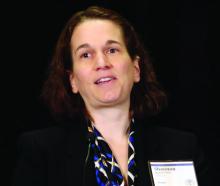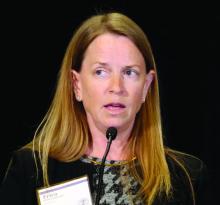Precision medicine taking shape in GI
AT THE 2017 AGA TECH SUMMIT
BOSTON – Fundamental questions remain over how best to use personalized medicine to predict and treat a variety of GI cancers, according to a panel of expert speakers at the 2017 AGA Tech Summit, sponsored by the AGA Center for GI Innovation and Technology.
“There are no rules presently, but we’re hoping to define some of the problems,” Abigail T. Berman, MD, MSCE, associate clinical director of the Penn Center for Precision Medicine in Philadelphia and associate professor of radiation oncology, told the audience. “To know how we’re going to pay for it, we need to define it.”
Emerging technologies: Worth the cost?
Among the growing number of novel predictive tools for clinical use is the liquid biopsy. Mechanical engineer Shannon Stott, PhD, assistant professor of medicine at Harvard Medical School, Boston, described how she applies her knowledge of microfluidics, optics, tissue engineering, and cryopreservation to clinical medicine and cell biology. She is the coinventor of the Herringbone Circulating Tumor Cell Chip, a liquid biopsy device that captures cancer cells circulating in the bloodstream of localized and metastatic cancer patients. By observing the biology of these extremely rare cells, she and her collaborators are helping identify novel pathways for metastasis.
She and her colleagues have been working on this process using breast cancer cells, and while their work is still preclinical, Dr. Stott said, “It’s interesting that the cells metastasize to the same location where we derived them from.”
“The take-home message is that we and others are starting to see evidence that liquid biopsies can provide clinically actionable information, even in the absence of a tissue biopsy,” Erica L. Carpenter, PhD, director of the Circulating Tumor Material Laboratory at the University of Pennsylvania, Philadelphia, said in an interview.
Although such research is ongoing, liquid biopsies are not ready for routine use to detect early stage disease, or for monitoring patients with minimal residual disease or those at risk for cancer, according to Dr. Carpenter. She said she expects the number and type of clinically relevant liquid biopsy tests will expand over the next 5-10 years, which will improve options for physicians.
“We are also exploring whether the sensitivity of current approaches for mutation detection in plasma can be improved to a point where such tests can be used beyond patients with advanced or metastatic disease.”
Dr. Carpenter, who was also a panelist in the discussion, described for the audience one of her own studies, a prospective look at 102 lung cancer patients.
“We found that although a clinical plasma DNA test was successfully completed for all patients, we were only able to complete tissue sequencing for half the patients. Said another way, for this cohort of advanced lung cancer patients, liquid biopsy was the only way to effectively detect mutations to help selection of therapy, including targeted therapies,” she said in the interview.
Other emerging predictive technologies for colorectal cancer prediction seek to repair defective DNA mismatch and detect specific mutations in tumors, according to panelist C. Richard Boland, MD, AGAF, professor of medicine at the University of California, San Diego.
Blood tests for miRNAs or other noncoding RNAs also show “promising data,” he said, although none of these tests have yet been verified as clinically useful. “We can probably do all these tests efficiently with a new diagnostic platform. Germline testing has gone to multigene platforms, and interpretation is the current challenge.”











